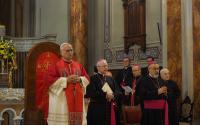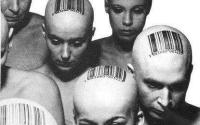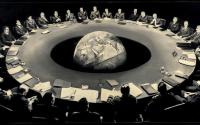15 September 2004Haaretz
There is one thing I regret: Having been the cause of his losing the Israel Prize. The Council for Israeli-Palestinian Peace, which I helped to found, was holding a debate in a large hall. I was afraid that a colloquium on peace wouldn't draw a large crowd, so I suggested that Prof. Yeshayahu Leibowitz be invited. I knew that his name on the program would fill any auditorium. On top of that, the judges had just announced their decision to award him the Israel Prize. He agreed right away, but he had a condition. He would only speak on one topic: the moral obligation of Israelis not to do military service in the occupied territories. I said yes, even though this wasn't the topic of discussion. Leibowitz was the first speaker. The hall was packed. The audience, which included a large number of university students, filled all the aisles. There were even people sitting on the windowsills. Leibowitz immediately launched into a tirade against the operations of the Israel Defense Forces in Gaza and the West Bank. He compared their actions to those of the Nazi SS. The media, which usually ignore events organized by the "radical" peace camp, pounced on it like a gold mine. Leibowitz's remarks got first-page coverage and set off a holy furor. The prize committee was asked to withdraw the nomination. Just as things reached a peak, Leibowitz announced that he declined to accept the prize. I don't think he was sorry about it. On the contrary, he loved expressing himself in the most provocative way. He did it on purpose. That's how he got the public and the media to sit up and pay attention. Ordinary opinions are boring. Leibowitz wanted to shock his listeners, to shake them out of their stupor and make them think. He also enjoyed it. Many of his quips will be remembered forever: the Western Wall as God's discotheque, religion as the mistress of the government, mixing religion and state leads to fascism. He had nothing but scorn for the Chief Rabbinate. Incidentally, it wasn't coincidental that he was the first speaker that night - and at every other debate I ever organized. I learned from experience that Leibowitz would make mincemeat out of every speaker who came before him. It didn't matter what their views were - left or right, moderate or extreme. Leibowitz would lay them out on the dissecting table and rip them to shreds with his keen, analytical mind and biting sarcasm. Nothing would be left whole. The way to get around this was to make him the first speaker, and then those after him could respond to what he said, which always yielded plenty of food for thought. I used to call him Yeshayahu (Isaiah) the Third (based on the theory that there were at least two different prophets by that name). That used to make him furious. "I'm not a prophet," he would say, "and anyone who says such a thing doesn't understand what a prophet is." As a religious Jew who wore a skullcap and observed the commandments, he believed that prophets spoke the word of God. They weren't just clairvoyants. To me, Leibowitz was a prophet in that second sense. He was the first person after the Six-Day War who predicted that occupying territories would destroy Israel from within. "In a few years, we will be a nation of foremen and Shin Bet [security service] agents," he prophesied - in other words, a nation of exploiters and oppressors. I also proposed at that time that we end the occupation immediately, but for a different reason. On the fifth day of the war, I appealed to Levi Eshkol, both in an open letter and personally, to allow the Palestinians to establish a state in the territories we had just conquered. I believed (and I still do) that this was one-time historic opportunity to make peace. Now, Leibowitz didn't believe in peace altogether. He had no knowledge of what life was like for the Palestinians, and maybe he wasn't even interested. He thought there was no solution to the conflict. He wanted to return the occupied territories right away to save the soul of Israeli society - not to reach a compromise with the Arab world. It was connected to his religious outlook. For a secular person like myself, it was very hard to understand that side of his personality. He was a scientist by training. He was incredibly knowledgeable, a man of absolute reason. But his religious outlook was light-years away from scientific logic. He didn't try to link the two. He rejected the very idea that it was possible. Religion, he explained, had nothing to do with logic. It existed on a different plane. Jews were supposed to observe the mitzvot - the religious commandments - not to get anything in return, not to bribe God and enlist his aid, but "just because." The mitzvot needed no explanation and couldn't be explained. Once he told me that Judaism had died 200 years ago. It hadn't created anything since then , or produced even one important thinker. All that remains, he said, are dry texts that people learn by rote. How could a man as religious as Leibowitz and a man as nonreligious as myself get along? We were like two people who come to the river from opposite directions and meet on an island in the middle. The island was our desire to end the occupation - a moral-religious demand on his part and a moral-political one on mine. Leibowitz couldn't work in a group. He was a comet, soaring alone in the heavens. He belonged to Oved Hadati, which was a kind of religious branch of Mapai, but dropped out. He hooked up with Shmuel Tamir when he founded the New Regime movement in 1959, but quarreled with him and got out before it moved to the far right. He formed an anti-nuclear association with Eliezer Livneh, but didn't get along with him either. Prophets are like that. Leibowitz did best when he was on his own. If he had any influence, it was because of his personality. His ammunition - cold, calculated logic, together with articulateness, passion and a razor-sharp tongue - attracted admirers. He was prepared to speak anywhere, anytime, in any godforsaken place, no matter how small the audience. Once he told me that it was a matter of principle for him: He would say what he had to say to anyone who was willing to listen, even in a telephone booth. When he was invited to lecture at the university, he would arrive in the taxi sent for him, sit in a chair on the side and read his little Bible. He lived like a monk. His only pleasure in life seemed to be things of the mind and the spirit. Today everyone agrees that his doomsday prophecy about the harmfulness of occupation has come true. Most of the public now understands what Leibowitz understood from the very first moment: that the settlements are a disaster for Israel. To Leibowitz, the people of Gush Emunim were idolaters. Their beliefs had nothing to do with Judaism. To impute holiness to the Western Wall, burial sites and hills was an abomination in his eyes. "When the Wahabis conquered Mecca," he once told me, "the first thing they did was smash the tomb of the Prophet Mohammed. They didn't leave a trace. Turning a burial site into a holy place was considered a desecration of Mohammed's teachings. The same is true for Judaism." No one knows where Moses is buried, and for good reason. By the same token, I don't visit the grave of Yeshayahu Leibowitz. For me, despite his protests, he remains a prophet. He is gone, and since his death there is no one to replace him.






